Affiliate links on Android Authority may earn us a commission. Learn more.
Turned location tracking off? US lawsuit says Google tracked you anyway.

- Google has been slapped with a lawsuit in the US over its location tracking.
- It’s claimed that Google continued to track users despite these users disabling location tracking functionality.
Google offers location tracking controls in its Android and iOS apps, but Washington DC, Washington state, Indiana, and Texas have now filed a lawsuit against the company for allegedly continuing to collect location data when the tracking was disabled by users.
“Google falsely led consumers to believe that changing their account and device settings would allow customers to protect their privacy and control what personal data the company could access,” said Washington DC attorney general Karl Racine in a statement. “The truth is that contrary to Google’s representations it continues to systematically surveil customers and profit from customer data.”
The attorney general’s office confirmed that it opened an investigation against Google after a 2018 Associated Press story revealed that Google tracks your location even when you disable the functionality.
What is Google accused of doing?
More specifically, the attorney general’s office took issue with Google publicly claiming between 2014 and 2019 that disabling the “Location History” setting means your location and visited places aren’t stored.
“That is false. Even when Location History is off, Google continues to collect and store users’ locations,” the office claimed.
It added that the search giant initially didn’t disclose that a “Web & App Activity” option that was enabled by default still allowed Google to collect location data. The office and suit further claimed that Google finds ways to track a user’s location even when location permissions are denied for its apps.
Finally, the suit alleges that Google uses so-called “dark patterns” to manipulate users into giving the search giant their location data. Examples cited include repeatedly asking users to enable location tracking in some apps and claiming an app won’t work properly without location data when it actually works fine.
Google told AFP in a statement that the claims were based on outdated information and were inaccurate, adding that it would “vigorously” defend itself.